A few years ago, if you wanted to get respectable power from a gaming laptop, it needed to be big and bulky. And even the largest gaming notebooks couldn’t come close to their desktop equivalents. However, the performance gap is beginning to narrow, and Origin PC’s EVO15-S represents a powerful package in a thin and light form factor. It does make some sacrifices in the name of portability, but still has a lot going for it.
Related: 10 Things To Look For In A Gaming Laptop
Design
For a gaming laptop, the Evo15-S is very thin at .7 inches and measures 15x0.7x9.8 inches overall. It’s also relatively light, weighing four pounds. For reference, Apple’s much smaller 13-inch MacBook Pro weighs a little over three pounds. It fit into our Everki Beacon backpack with relative ease and never felt like a back-breaker.
The laptop uses a 15.6-inch IPS display, which offers vivid, accurate colors and wide viewing angles. The native 1080p resolution is great for a gaming laptop this size. Overall, this is a nice panel.
The laptop features a mostly gloss finish, which looks nice, but can attract fingerprints. There are a wide variety of color options to choose from, but Origin sent us a black unit with the GameSpot logo painted on the back.
The keyboard uses run-of-the-mill chiclet-style keys, which feel competent to type and game on. It also offers RGB backlighting across three color zones, which help you see the keys a bit better at night while looking a little stylish. The trackpad responds pretty well, though we would have preferred dedicated left and right click buttons to prevent accidental clicks. In terms of audio, the speakers are powerful for the laptop’s size, but lack a bit of bass.
The chassis is mostly made of plastic, which results in some minor, undesirable flexing. When we gamed on the notebook, the keyboard surface never got hot and the laptop did a good job exhausting hot air through the back, but it did get moderately loud. This is most likely a thermal trade-off the notebook has to make for being so thin.
Speaking of thin, portable gaming notebooks usually don’t offer a lot of ports, but the EVO15-S delightfully surprises here. The laptop offers a plethora of connections that include three USB 3.0 ports, a Mini DisplayPort, HDMI port, and more. It has enough ports for either the Oculus Rift or HTC Vive, which makes it a great portable VR system on the go.
Perhaps our biggest gripe with the design is the placement of the power button, which is situated to the front right of the chassis. You may inadvertently turn off the computer, if you’re not being careful. We also didn’t like how the power port is located on the right, which can slightly obstruct right-handed mouse users.
Specs
CPU | Intel Core i7-7700HQ |
GPU | Nvidia GeForce GTX 1060 (6GB) |
RAM | 16GB 2400MHz Dual Channel DDR4 Memory |
Display | 15.6-inch 1920x1080 IPS |
Storage | 512GB NVME M.2 and 2TB 5400RPM HDD |
Ports | 1xUSB 3.1 (Type-C), 3xUSB 3.0, 1xUSB 2.0, 1x Mini DisplayPort 1.2, 1xHDMI 2.0, 1x headphone out, 1x microphone in, 1x RJ-45, 1xSD card reader |
The brains behind the laptop is Intel’s 2.8GHz quad-core i7-7700HQ Kaby Lake CPU, which can turbo up to 3.8GHz. The mobile processor is paired with 16GB of DDR4 RAM clocked at 2400MHz in a dual-channel configuration. Nvidia’s GeForce GTX 1060 drives the graphics here, and it’s a great GPU that pairs well with the panel’s 1080p resolution.
For storage, the EVO15-S uses Samsung’s high-end SM961 NVMe solid-state drive. You can get it in either 256GB or 512GB variants; our unit featured the latter. It’s also supplemented by a hefty 2TB 5,400RPM hard drive. Overall, the system’s specs are well balanced and represent a moderately high-end rig.
Benchmarks
We’re going to benchmark the EVO15-S alongside HP’s 17-inch Omen gaming laptop, which is equipped with a GTX 1070, i7-6700HQ, and 16GB of RAM. While the Omen uses a slightly older Skylake CPU, because it is significantly bigger and equipped with a higher tier GPU, you shouldn’t expect the same level of performance. It’s mostly here to give you a point of comparison.
For our game benchmarks, we ran all titles at their respective max settings at 1080p to really stress test the GPUs.
Game Benchmarks
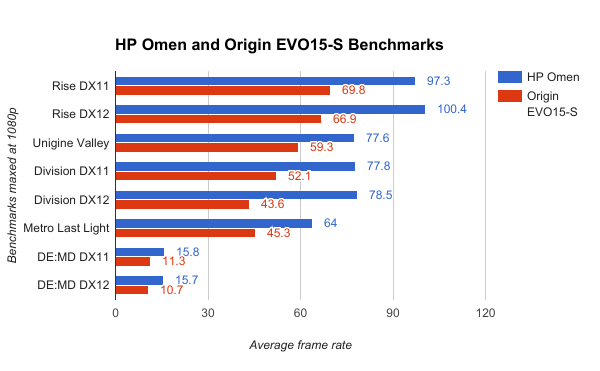
As you can see from our performance data, while the EVO15S lags behind the Omen in our gaming benchmarks, it should be able to max out most games at 1080p with playable frame rates. Running the Rise of the Tomb Raider benchmark with graphics settings maxed out, Origin PC’s laptop was able to run above 60 average FPS with either the DX11 or DX12 API. The EVO15-S came within spitting distance of averaging 60FPS in the Unigine Valley benchmark with its 59.3 average frame rate. In more graphically demanding games like The Division and Metro: Last Light, however, it did dip into the low 50s and 40s, but it was still highly playable. The laptop did struggle to max out Deus Ex: Mankind Divided, however, which is one of the most graphically demanding games on the market. When we tried to max out Eidos Montreal’s stealth action game, the EVO15-S barely made it over 10FPS in DX11 or DX12. The laptop was able to run the benchmark at 57 average FPS when we disabled anti-aliasing and lowered the game to its high preset, however.
Synthetic Benchmarks
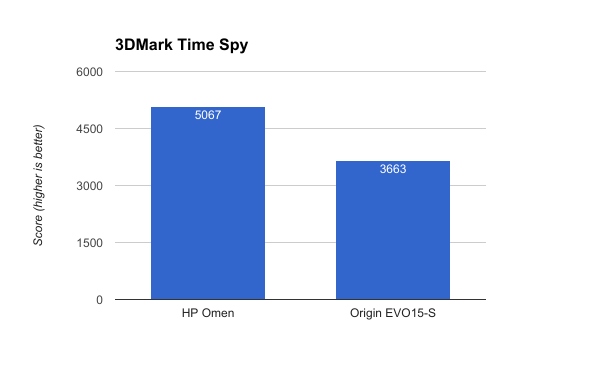
Moving over to our synthetic graphics benchmarks, in 3DMark Time Spy, a DirectX 12 benchmark, EVO15-S achieved a 3663 score, which is 28 percent lower than the HP Omen.
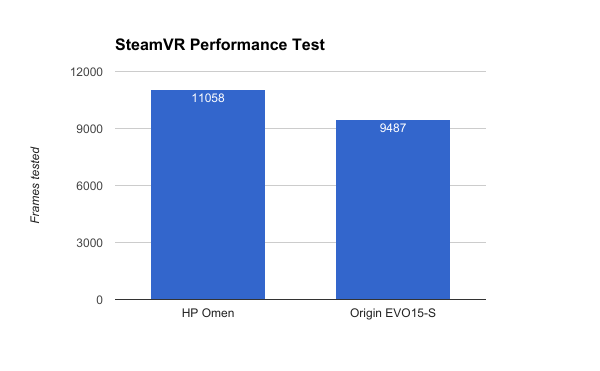
When we ran Valve’s Steam VR benchmark, the Origin PC laptop produced 9487 frames, which not only makes it VR ready, but puts it in the “high” tier.
Storage, CPU, and Battery Benchmarks
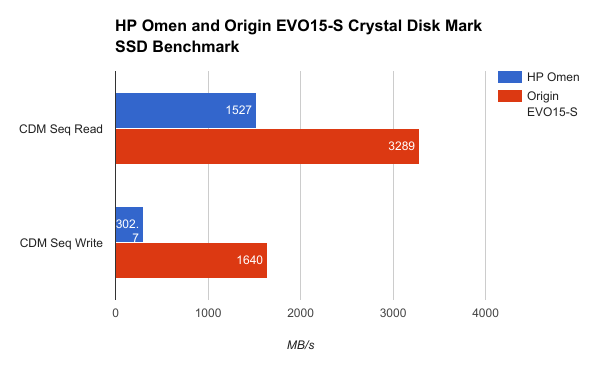
While the Omen’s faster GPU allowed it to pull ahead in games, the EVO15’s speedier NVMe SSD allows it to beat HP’s notebook in sequential read and write tests by 115 and 442 percent, respectively. This means Origin’s laptop really kills it whenever you need to transfer large files or are downloading a bunch of games.

According to our Cinebench CPU test, the EVO15-S is 16 percent faster in single-threaded applications and 10 percent faster in multi-core workloads. These tests indicate that Origin PC’s laptop make it a stronger productivity workhorse than the HP Omen.
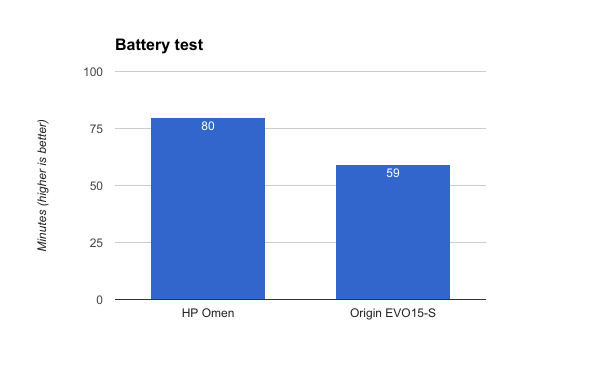
For a battery test, we looped the Unigine Valley benchmark until the laptop keeled over. While you can undoubtedly get better battery performance if you’re just browsing the web or watching a movie, this represents a worst-case gaming scenario. Here, Origin’s laptop lasted roughly an hour, which isn’t great and is 26 percent worse than the bigger Omen notebook. You’ll most likely want to bring the charger with you if you intend to game on the go.
Conclusion
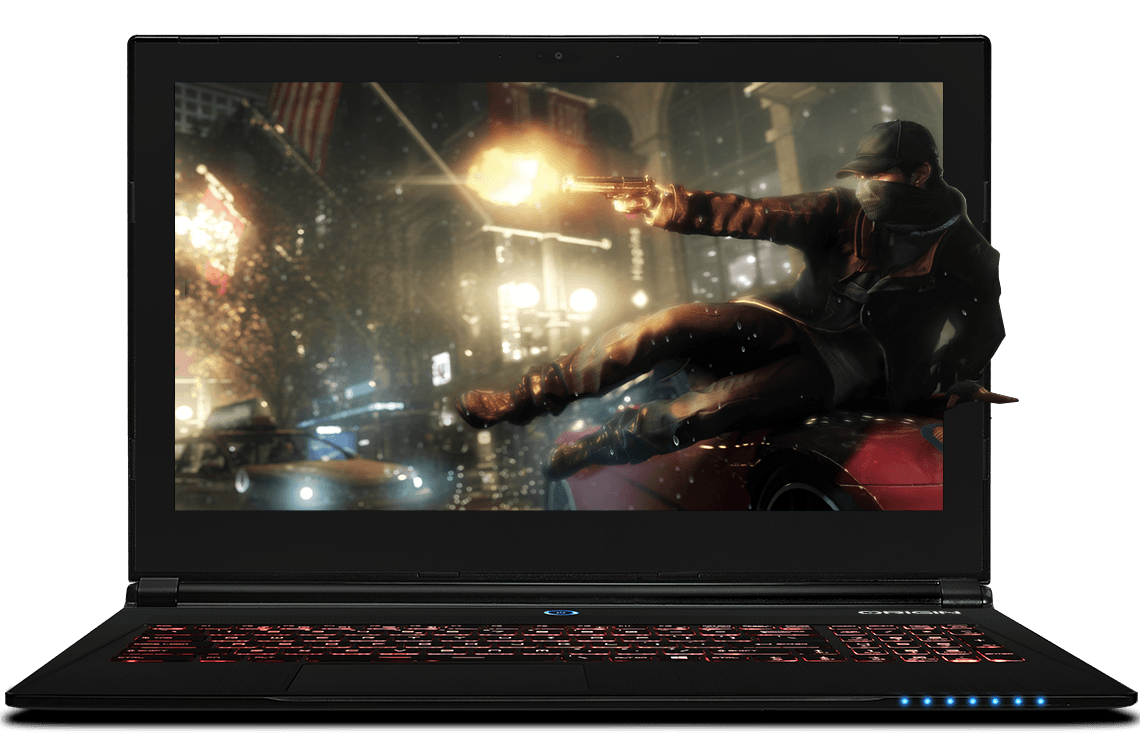
While you can find gaming laptops that are more powerful, there’s a lot to like about the EVO15-S. For a gaming notebook, it's thin, light, and offers a surprising amount of ports. In terms of specs, it offers a ton of bells and whistles and should be able to max out most games at 1080p. Its biggest hurdle is the $2,317 price tag. You’re really paying for the portable form factor here. If size and weight aren’t big priorities for you, and you’re just looking for something to occasionally lug around to LAN parties, something like the Omen might be more up your alley. HP’s gaming laptop might weigh considerably more at 7.3 pounds, but you can get it with a more powerful GTX 1070 GPU for around $1,800. If you have the money and want good specs in a sleek form factor, however, Origin PC’s EVO15-S should be on your radar.













